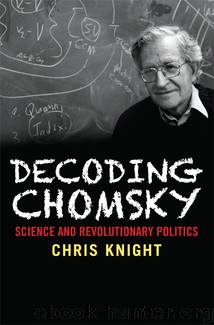Decoding Chomsky by Chris Knight

Author:Chris Knight
Language: eng
Format: epub
ISBN: 9780300221466
Publisher: Yale University Press
CHAPTER 17
THE SOUL MUTATION
Chomsky’s insistence that language did not gradually evolve – his doctrine that it emerged in a single step – is so diametrically at odds with pretty much the whole of modern science that we are forced to ask why he feels driven to champion this strange idea. Since there cannot be any empirical justification for it, we are obliged to look elsewhere. I suspect that the explanation must lie in the pressures and contradictions of his institutional milieu.
Back in the seventeenth century, Descartes imagined himself an earthly clockmaker, concluding, naturally enough, that it was not possible, even in principle, to assemble a human soul in his workshop. He concluded that such a God-given entity – the secret of language – must forever remain a mystery. Chomsky is able to reverse Descartes’s conclusion only by imagining himself in the reverse role, no longer as human clockmaker, but as God himself, the ‘divine architect’. He then tries to imagine what God would have done.
Before telling us, Chomsky reminds us of the difficulties. ‘Language’, he states, ‘is, at its core, a system that is both digital and infinite.’ All known biological systems are the opposite, being graded and limited. Why the human language organ should be so utterly different ‘is a problem, possibly even a mystery’. Since ‘there is no other biological system with these properties,’ Chomsky continues, we are left ‘with the problem of how this capacity developed in humans and how a messy system such as the brain could have developed an infinite digital system in the first place’.1
Having posed the baffling question, Chomsky resists all serious attempts at an answer. During the 1950s and 1960s, he had not felt any strong need to come up with an answer to the evolutionary questions that must arise if you claim to be doing biology. He could simply say language is an organ and leave it at that. During the 1970s, however, scientists who had become aware of his claim to be doing biology began to wonder how such an organ might have evolved. If an organ exists, then logically it must have evolved – or so everyone thought. With that idea in mind, a number of evolutionary scholars invited the most prominent linguists of the day to contribute to an interdisciplinary conference on the origins and evolution of language.
Convened in Chicago in 1976, this was the first time an international academic event had been dedicated to this topic. Chomsky’s contribution was entitled ‘On the Nature of Language’. While talking at length about fixed principles, he said not a word about origins or evolution. As he outlined detail after detail of his latest linguistic thinking, a sense of frustration built up among the audience. Eventually, one of the organizers felt prompted to remind him of the topic: ‘Let me just ask a question which everyone else who has been faithfully attending these sessions is surely burning to ask … how did language get that way?’2 Chomsky’s response was to stonewall: ‘What is interesting to me is that the question should be asked.
Download
This site does not store any files on its server. We only index and link to content provided by other sites. Please contact the content providers to delete copyright contents if any and email us, we'll remove relevant links or contents immediately.
The Art of Thinking Clearly by Rolf Dobelli(10472)
Mindhunter: Inside the FBI's Elite Serial Crime Unit by John E. Douglas & Mark Olshaker(9332)
Change Your Questions, Change Your Life by Marilee Adams(7771)
Nudge - Improving Decisions about Health, Wealth, and Happiness by Thaler Sunstein(7698)
Mastermind: How to Think Like Sherlock Holmes by Maria Konnikova(7334)
The Power of Now: A Guide to Spiritual Enlightenment by Eckhart Tolle(5769)
Men In Love by Nancy Friday(5237)
Altered Sensations by David Pantalony(5097)
Factfulness: Ten Reasons We're Wrong About the World – and Why Things Are Better Than You Think by Hans Rosling(4738)
The Confidence Code by Katty Kay(4252)
Thinking in Bets by Annie Duke(4221)
Man and His Symbols by Carl Gustav Jung(4134)
The Worm at the Core by Sheldon Solomon(3486)
Why Buddhism is True by Robert Wright(3449)
Liar's Poker by Michael Lewis(3445)
Three Women by Lisa Taddeo(3430)
The Inner Life of Animals by Peter Wohlleben(3316)
Descartes' Error by Antonio Damasio(3275)
How Music Works by David Byrne(3264)
